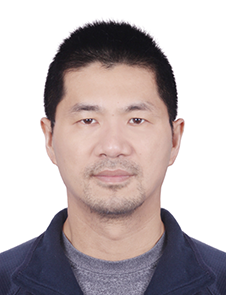STAFF

Faqiang Li, Ph.D.
Professor
College of Life Sciences,
South China Agricultural University,
Guangzhou, Guangdong 510642, China
E-mail: Fqli@scau.edu.cn
/2018/0809/c3190a107188/page.htm
Education
Ph.D. 2001 2008The Graduate School and University Center of the City
University of New York, New York, USA (Biochemistry)
M.S. 1998 2001Sun Yat-sen University, Guangzhou, China (Genetics)
B.S. 1994 1998Sun Yat-sen University, Guangzhou, China (Microbiology)
Professional Biography
Professor Li received his B.Sc. in Microbiology and M.S. in Genetics from Sun Yat-sen University, China. He received his Ph.D. in Biochemistry the Graduate School and University Center of the City University of New York, USA. Dr. Li completed a post completed a post-doctoral appointment in the Department of Genetics, University of Wisconsin in Madison, USA and joined the faculty at south China Agricultural University in 2015.
Research Description
My research interests focus on the function and regulation of plant autophagy. Autophagy (“self-eating”) is a highly conserved degradation process in eukaryotes whereby organelles and cytoplasm are sequestered in vesicles, which are subsequently delivered to the vacuole for breakdown. Autophagy-mediated turnover plays an essential role in cellular housekeeping and is critical for plant defense and robust nutrient recycling. We are interested in elucidating the role of plant ATG (AuTophaGy-related) genes to understand the contributions of autophagy to plant biology, which may offer us new strategies to improve the agronomic performances and yields of crops by altering this process.
Selected Publications
Huang, X., Zheng, C., Liu, F., Yang, C., Zheng, P., Lu, X., Tian, J., Chung, T., Otegui, M.S., Xiao, S., Gao, C., Vierstra, R.D.*, and Li, F.* (2019). Genetic analyses of the Arabidopsis ATG1 kinase complex reveal both kinase-dependent and independent autophagic routes during fixed-carbon starvation. The Plant Cell. 31:2973-2995
Liu, F., Marshall, R.S., and Li, F.* (2018). Understanding and exploiting the roles of autophagy in plants through multi-omics approaches. Plant Sci. 274:146-152
Li, F., Chung, T., Pennington, J.G., Federico, M.L., Kaeppler, H.F., Kaeppler, S.M., Otegui, M.S., and Vierstra, R.D.* (2015) Autophagic recycling plays a central role in maize nitrogen remobilization. The Plant Cell. 27:1389-408
Marshall, R.S., Li, F., Gemperline, D.C., Book, A.J., and Vierstra, R.D.* (2015) Autophagic degradation of the 26S proteasome is mediated by the dual ATG8/ubiquitin receptor RPN10. Mol.Cell. 58:1053-1066
Li F., and Vierstra, R.D.* (2014) Arabidopsis ATG11, a scaffold that links the ATG1-ATG13 kinase complex to general autophagy and selective mitophagy. Autophagy. 10:1466-1467.
Li, F., Chung, T., and Vierstra, R.D.* (2014) Autophagy-related (ATG) 11 plays a critical role in general autophagy and senescence-induced mitophagy in Arabidopsis. The Plant Cell. 26:788-807.
Li, F., and Vierstra, R.D.* (2012) Autophagy, a multifaceted intracellular system for bulk and selective recycling. Trends in Plant Sci. 17: 526-537.
Li F., and Vierstra, R.D.* (2012) Regulator and substrate: Dual roles for the ATG1-ATG13 kinase complex during autophagic recycling in Arabidopsis. Autophagy. 8: 982-984.
Suttangkakul, A., Li, F.#, Chung, T., and Vierstra, R.D.* (2011) The ATG1/ATG13 protein kinase complex is both a regulator and a target of autophagic recycling in Arabidopsis. The Plant Cell. 23: 3761-3779. (# Co-first author)
Li F., R. Vallabhaneni, J. Yu, T. Rocheford, and E.T. Wurtzel* (2008) The maize phytoene synthase gene family: overlapping roles for carotenogenesis in endosperm, photo- morphogenesis, and thermal stress-tolerance. Plant Physiol. 147: 1334-1346.
